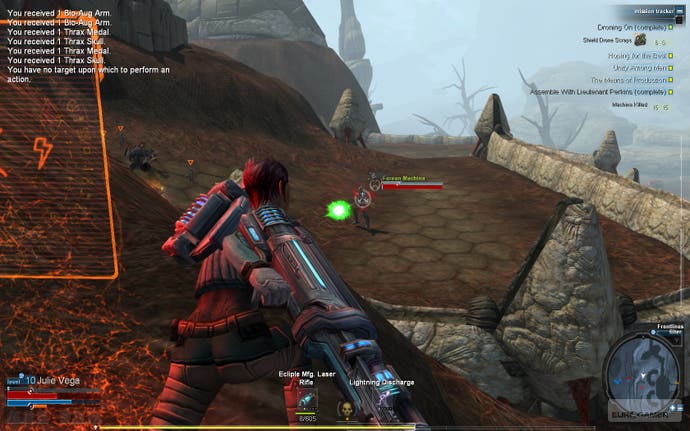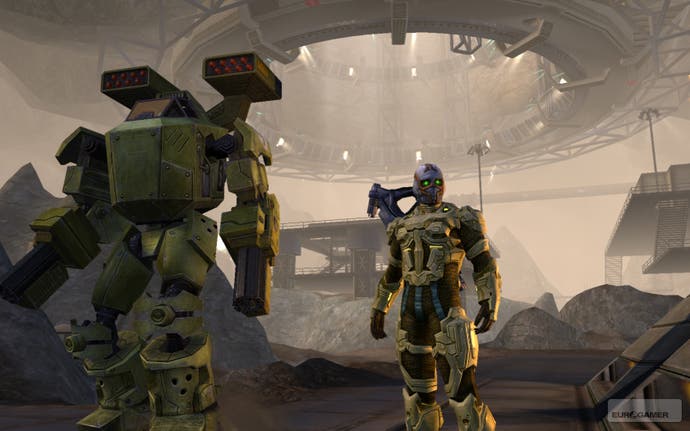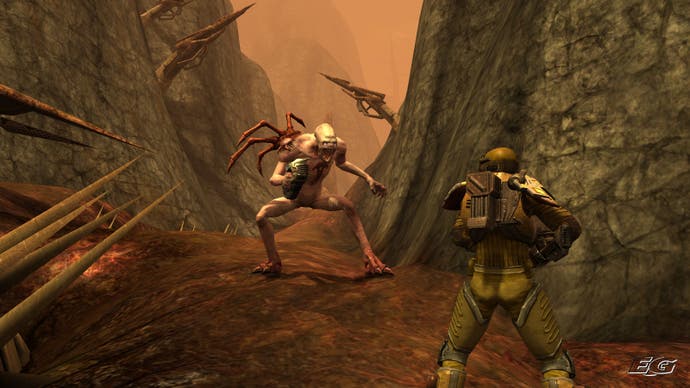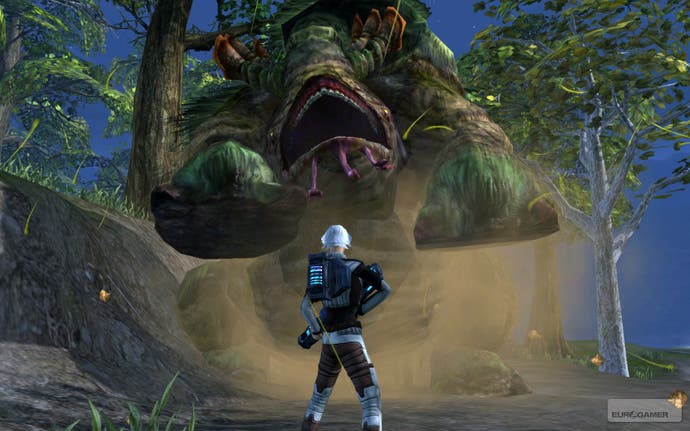Tabula Rasa
Richard Garriott on breaking the MMOG mould.
Call us cynics, but when a game designer takes the podium to lambast all the other games in his chosen genre for being stale, stagnant and un-innovative, our first response tends to be somewhat uncharitable. Eurogamer writers stand around in front of mirrors perfecting the Roger Moore arched eyebrow and the innocently purred "so, what are you doing about this?" - so yes, call us cynics. We'll shake your hand.
Richard Garriott, though... Well, we'll grudgingly accept that if anyone is going to go off on one about MMORPG design being stale and rooted in the past, he's got more of a right than most. After all, he practically invented the genre with Ultima Online - or at the very least, popularised it after a few other stabs in the dark from titles like Meridian 59. If anyone's got a right to slag off the Sistine Chapel, it's probably Michelangelo.
Besides, Garriott doesn't pull his punches - and we appreciate a man with un-pulled punches. We appreciate a man who dismisses every MMORPG on the market at present as "manic level grinding, keep up with the Joneses, turn-based whack-a-mole" (owch!) without then rushing to tell us that was off the record.
Finally, we really appreciate a man who isn't just moaning for the sake of it. Garriott doesn't have an axe to grind; he just thinks he's got a better game. He may even be right.
Blank Slate

Tabula Rasa is Richard Garriott's return to the MMORPG space, ten years after practically creating it with Ultima Online. When he talks about the changes that have taken place in the market since his last title, he's certainly impressed by the commercial success. He's full of praise for WoW, up to a point, describing it as a "wonderful product" and noting Blizzard's talent for "polish" - but on a very basic level, Garriott almost seems disappointed at how little the genre has evolved since UO.
"Ultima Online was frankly a stab in the dark," he explained. "There were no giant, successful, massively multiplayer games prior to Ultima Online. So the features we put into the game were basically first attempts at what might work in an MMO space."
"Similarly, EverQuest, which was developed at about the same time - it really had quite a few differences to Ultima Online, but those two games basically established the original feature set that you now see in most MMOs."
"What I'm critical of, in our industry, is that over the last ten years most MMOs have included those exact same features... I'm a critic of is the MMO genre, the space - all the games we've produced," he says bluntly.
"Those fundamentals are serviceable, clearly - I mean, the genre has grown immensely, in spite of the fact that I think that the type of features which we offer players have not evolved very much."
"That's really the idea with Tabula Rasa. In fact, the whole name of the game - Tabula Rasa, blank slate. The whole point is to wipe the slate clean."

Okay, so that's the election pitch - but so far, so rhetoric. Wiping the slate clean is all very well, but what does Richard Garriott plan on building in its place?
"From a fiction standpoint, the one thing we didn't want to do was medieval fantasy," he says. "We've all been doing medieval fantasy for 25 years, and almost every MMO is medieval fantasy - so that was the one thing we weren't going to do."
Instead, Tabula Rasa is a near-future science fiction story, set in a universe where the earth has been attacked by a nasty alien race called the Bane. The survivors of the attack fight back against the aggressors, using technology nabbed from an ancient and apparently extinct race called the Eloh. At release, the game will feature two planets on the front-line of the battle; future expansions will, presumably, add additional planets.
The science fiction setting, of course, isn't entirely innovative - games like Anarchy Online got there first, after all. However, given that Garriott is best known for the medieval fantasy of the Ultima series, it's an indication of how far he's prepared to depart from his "comfort zone" with the new game. In light of the changes to the MMO game formula he proceeds to show us, the sci-fi setting even starts to feel like one of the more minor departures.
Back to Basics

Aside from moving away from medieval fantasy, Garriott points at three key areas in which Tabula Rasa will be departing from previous MMOs. Firstly, the game promises what he describes as a "fast-paced, tactical combat system". Secondly, it will all take place across dynamic battlefields, with computer controlled characters actively involved in fighting for territory and bases being captured and lost as the game ebbs and flows.
Finally, he believes that the team has crafted a storytelling system vastly more complex than anything previously seen in a massively multiplayer title.
Rather than simply reading the mission text and then doing exactly what it wants, the game will ask players to make moral, ethical judgements about how they carry out their missions - or whether they carry them out at all. Those choices can have major ramifications further down the line in the game, a system which is occasionally found in offline RPGs but has rarely strayed online.
While that's certainly a welcome twist to the genre, our interest is piqued most of all by the claim that Tabula Rasa will deliver fast-paced, tactical combat - something which seems far out of reach for existing MMO titles. Garriott is withering in his criticism of games which fail to engage the players in the action before them, focusing instead on a "safe" turn-based system.

"Once you highlight an opponent, you know that they're going to sit there in a turn-based way attacking you," he says. "You could put a black cloth over the top two-thirds of the screen, and watch only your text window and your shortcut bar - and play the rest of the game until the combat is done."
"In our mind, that's an example of a world not being set up correctly. I'm not really immersed in the battle that's going on, because I'm not paying attention to what's going on. All I'm watching is the numbers."



